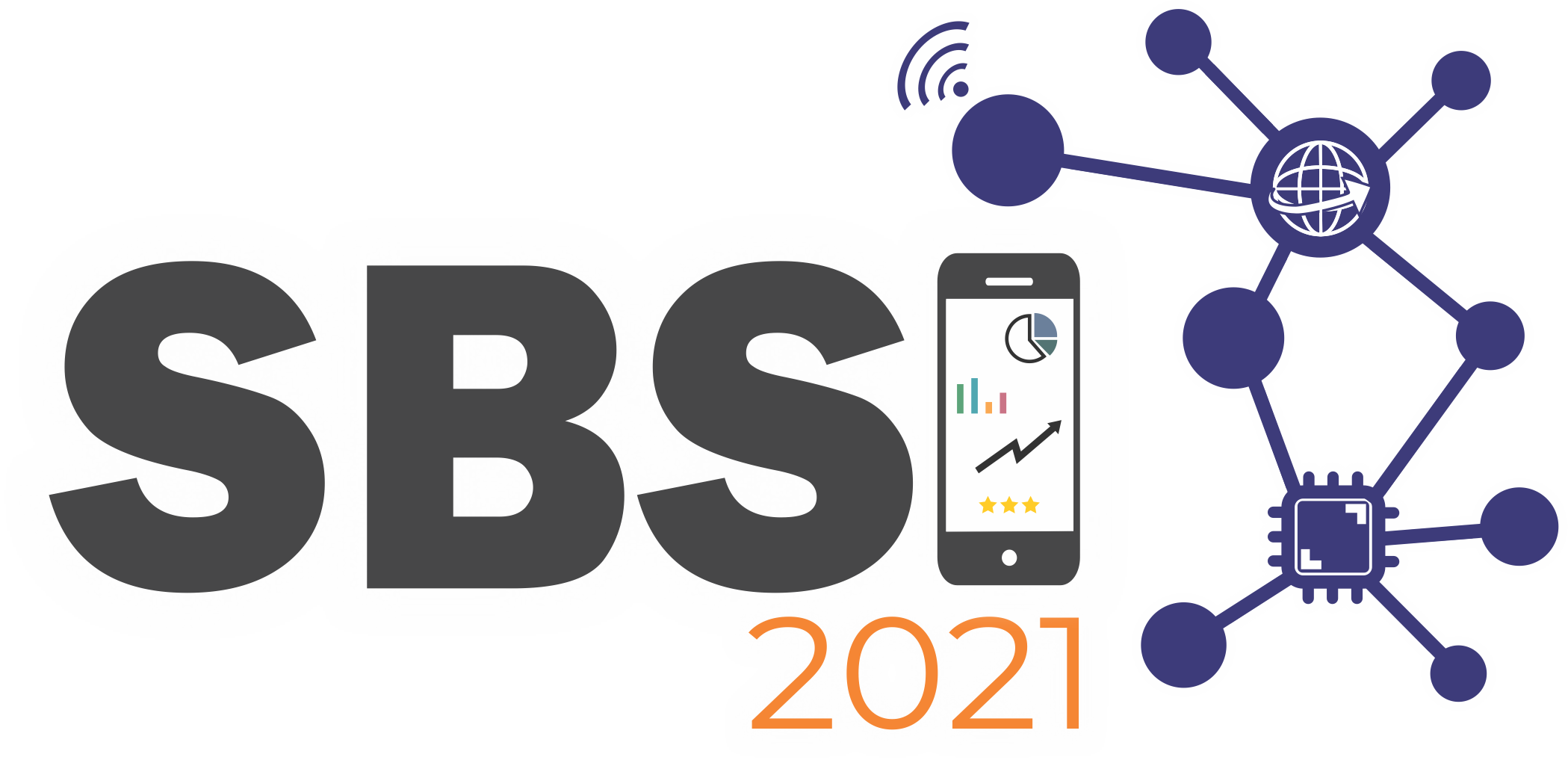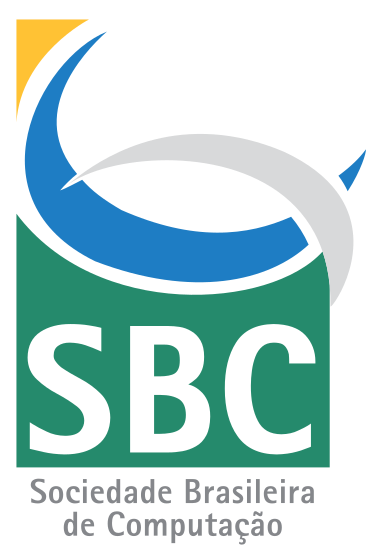VIII Workshop on Scientific Initiation in Information Systems (WICSI) - English
Call for the VIII WICSI of SBSI 2021

The VIII Workshop on Scientific Initiation in Information Systems (WICSI 2021) is a national event that aims to disseminate research work at the undergraduate level in Information Systems (IS). The objective of WICSI is to encourage the development of Scientific Initiation research. For this purpose, it seeks to encourage undergraduate students with scientific initiation work in the IS area to present their work on the various topics of interest to SBSI. The target audience of WICSI is undergraduate students who want to present their work and research projects in progress or recently concluded. Scientific initiation projects completed in 2020 can be submitted, even if students graduated in the second semester of 2020.
This workshop's audience will have the opportunity to participate in a vital forum dedicated to the presentation and discussion of ongoing research by undergraduate students in the IS area. The goal is to encourage integration between undergraduate and graduate students and members of academia and industry and give visibility to potential researchers and professionals with the academic community and the private sector.
WICSI takes place as part of the Brazilian Symposium on Information Systems (SBSI), an event aimed at presenting scientific papers and discussing relevant topics in the Information Systems area, bringing together students, researchers, professionals, and entrepreneurs who work in the area. The Symposium program includes technical sessions, invited lectures, short courses, panels, and workshops.
Topics of Interest
The topics of interest suggested for papers submitted to WICSI 2021 are the same as those of the regular track of SBSI 2021, being the following
- Theory, epistemology, and methodology of research in information systems;
- Technological, social, economic, and environmental aspects and impacts of information systems;
- Management of organizational information systems and processes;
- Challenges of information systems applied to domains (Health, Agriculture, Government, Education, among others);
- Information systems for data, information, and knowledge management;
- Information Systems-Systems;
- Information systems and the open world;
- Sociotechnical view of information systems;
- Paradigms, modeling, design, engineering, and evaluation of information systems;
- The complexity of information systems;
- Interdisciplinary research in information systems;
- Education in information systems;
- Emerging technologies applied to information systems;
- Ethics, culture, legislation, and policy in information systems;
- Digital and business ecosystems;
- Intelligent and Omnipresent Information Systems: new challenges and opportunities.
Besides, contributions should address the central theme of the event, "Intelligent and Omnipresent Information Systems: new challenges and opportunities" and the themes of the Major Research Challenges in IS defined by the Information Systems research community. Click here to access the E-Book.
Submission Instructions
Papers submitted to WICSI 2021 are limited to 4 (four) pages, including abstract, figures, tables, and references. Some additional aspects should be noted:
- Papers must be written in Portuguese or English and must be sent in PDF format. In the case of papers in Portuguese, the Abstract in English must be included, in addition to the Abstract
- The mandatory format of the paper is the SBC Model for Publication of Papers
- Advisors and co-supervisors must also be registered as authors of the Paper
- The paper must indicate the nature of the contribution and the problems, domains, or environments in which it applies. The following structure for the paper is suggested: Introduction (relating to the IS area), Theoretical Foundation, Research Methodology, Results, and Conclusion
- The selection of works will be carried out based on the review by the program committee members. The review process will be conducted anonymously (double-blind review), and at least two reviewers will analyze any proposal. Consequently, ALL and any reference that identifies the provenance of the paper (such as authors' names, names of projects, tools, and citations of papers that identify the authors) must be removed from the submission version and replaced with "REMOVED FOR REVIEW"
- Submissions must be made through the SBC JEMS system (https://jems.sbc.org.br/home.cgi?c=3709). Submissions in files other than PDF format, papers with the authors' identification, and those that exceed the maximum number of pages or that violate the formatting instructions will be disregarded
Instructions for accepted papers
Papers accepted and presented during SBSI 2021 will be published as part of the volume Extended Proceedings of SBSI 2021, subject to the following aspects:
- Information such as the name of the authors, names of projects, tools and citations of papers that identify the authors must be added in the final version of the paper
- Suggestions for improvement by reviewers should be added to the final version of the paper
- Together with the final version of the accepted paper, the authors must submit to the JEMS the SBC Copyright Assignment Agreement and proof of registration for the event (including the Publication Fee)
- The scientific initiation student must register at SBSI 2021 and present the work in oral format and / or poster, in a time stipulated by the event organization, to a panel, which will evaluate the quality of the presentation and may ask questions to the author. The student's non-participation implies exclusion from work.
We are waiting for you at SBSI 2021!
Important dates
- Call launch: January 22, 2021
- Paper submission:
March 29, 2021April 5, 2021 - Notification of Authors: April 26, 2021
- Final version delivery: May 10, 2021
- Deadline for registration of at least one author per work: May 10, 2021
- Presentation at the event: 7-10 June 2021
Program Committee
- Carlos Silva – Instituto Federal de Minas Gerais (IFMG)
- Celia Ralha – Universidade de Brasília (UnB)
- Daniel Notari - Universidade de Caxias do Sul (UCS)
- Darlinton Carvalho - Universidade Federal de São João del-Rei (UFSJ)
- Davi Viana - Universidade Federal do Maranhão (UFMA)
- Denilson Pereira – Universidade Federal de Lavras (UFLA)
- Denis Fantinato - Universidade Federal do ABC (UFABC)
- Diana Adamatti – Universidade Federal do Rio Grande do Sul (UFRGS)
- Diego Garcia - Universidade Federal de Ouro Preto (UFOP)
- Eduardo Figueiredo – Universidade Federal de Minas Gerais (UFMG)
- Elisa Huzita - Universidade Estadual de Maringá (UEM)
- Ivan Machado – Universidade Federal da Bahia (UFBA)
- Johnny Marques – Instituto Tecnológico de Aeronáutico (ITA)
- Jéssyka Vilela - Universidade Federal de Pernambuco (UFPE)
- Juliano Lopes de Oliveira - Universidade Federal de Goiás (UFG)
- Karla Fook – Instituto Tecnológico de Aeronáutica (ITA)
- Leonardo Chiwiacowsky - Universidade de Caxias do Sul (UCS)
- Leonardo Costa - Universidade Federal de São João Del Rei (UFSJ)
- Lourenço Alves Pereira Junior - Instituto Tecnológico de Aeronáutica (ITA)
- Luanna Lopes Lobato - Universidade Federal de Goiás (UFG)
- Marcelo Manzato - Universidade de São Paulo (USP)
- Marcelo Morandini – Universidade de São Paulo (USP)
- Marlon da Silva – Instituto Federal de São Paulo (IFSP)
- Matheus Viana - Universidade Federal de São João del-Rei (UFSJ)
- Maurício Souza – Universidade Federal de Lavras (UFLA)
- Rafael Coelho - Instituto Federal do Rio Grande do Sul (IFRS)
- Ramon Costa – Universidade Federal de Lavras (UFLA)
- Renan Cattelan – Universidade Federal de Uberlândia (UFU)
- Renato Fileto – Universidade Federal de Santa Catarina (UFSC)
- Rodrigo Campos Bortoletto - Instituto Federal de São Paulo (IFSP)
- Rodrigo Monteiro - Universidade Federal Fluminense (UFF)
- Rodrigo Santos - Universidade Federal do Estado do Rio de Janeiro (UNIRIO)
- Sofia Paiva - Universidade Federal de São João del-Rei (UFSJ)
- Vinicius Garcia - Universidade Federal de Pernambuco (UFPE)
- Vinícius Sebba Patto - Universidade Federal de Goiás (UFG)
- Wendel Melo – Universidade Federal de Uberlândia (UFU)
- Wylliams Santos - Universidade de Pernambuco (UPE)
WICSI 2021 Chairs:
Johnny MarquesInstituto Tecnológico de Aeronáutica (ITA)
johnny (at) ita (dot) br
Renan G. Cattelan
Universidade Federal de Uberlândia (UFU)
renan (at) ufu (dot) br
SBSI 2021 Publication Chair:
Awdren FontãoUniversidade Federal do Mato Grosso do Sul (UFMS)
SBSI 2021 General Chairs:
Rafael D. AraújoUniversidade Federal de Uberlândia (UFU)
rafael (dot) araujo (at) ufu (dot) br
Fabiano A. Dorça
Universidade Federal de Uberlândia (UFU)
fabianodor (at) ufu (dot) br

